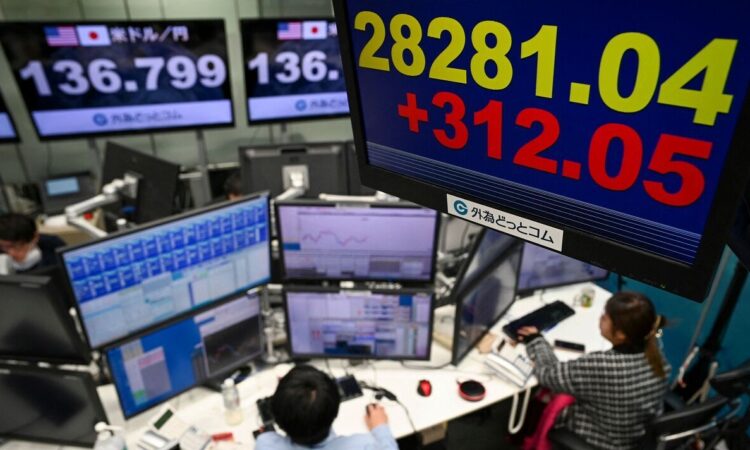‘It will get better’: Bankers in UK and US raise hope that inflation will plummet | Politics | News

Bank of England chief economist Huw Pill said costs would fall “quite rapidly” in 2023 as gas prices ease. Analysts have even predicted that inflation – branded “evil” by Jeremy Hunt – could plunge from its current 11.1 percent to as low as two percent in the next 12 months.
Such a fall would bring a much-needed boost to hard-pressed families struggling with soaring food and energy bills.
It also provides a glimmer of hope that things will finally get better following the grind of the Covid pandemic and the cost of living crisis.
Mr Pill said the Bank expects gas prices will stabilise “and then slowly begin to come off”.
“We are expecting to see headline inflation tail off in the second half of next year quite rapidly on account of those base effects,” he told an economic summit hosted by the Institute of Chartered Accountants in England and Wales.
Inflation may have peaked globally too with figures showing it has fallen in the eurozone from 10.6 percent in October to 10 percent in November.
China’s slight shift in its Covid stance by easing some virus restrictions could also have a positive ripple effect on the world economy too.
There are also indications that it could begin to fall in the UK from its current 41-year high during the first quarter of the year with the drop speeding up from the summer onwards.
Martin Beck, chief economic adviser to the EY Item Club, has said inflation could even plunge to two percent by the end of 2023.
That would take it back to “normal” levels, leaving millions with more of their hard-earned cash in their pocket.
The Economist Intelligence Unit also predicts cost increases will ease globally in 2023 as higher interest rates remove some of the demand pressure and supply-chain blockages start to ease.
“Unless the war in Ukraine escalates, we predict that commodity prices for energy, food and for supplies such as metals are likely to fall sharply in 2023 compared with 2022 levels, although they are likely to stay higher than previous levels,” it said.
The Chancellor has made tackling inflation as his number one aim, describing it in this month’s Autumn statement as an “evil” that “erodes the pound in your pocket”.
Mr Hunt added that the Office for Budget Responsibility had confirmed the Government’s actions will “help inflation to fall sharply from the middle of next year”.
Despite the more positive outlook on the cost of gas, food prices remain stubbornly high, increasing at a record rate in the year to November.
Food inflation hit 12.4 percent, up from 11.6 percent in October, according to the British Retail Consortium (BRC).
BRC boss Helen Dickinson said winter looked “increasingly bleak” but said there were signs that cost pressures, and price rises, might start to ease next year.
Meanwhile, shopper footfall stumbled again in November as the cost-of-living put consumers off Christmas spending.
Total UK footfall was 13.3 percent below pre-pandemic levels last month and 1.5 percentage points worse than October, according to BRC-Sensormatic IQ data.
Ms Dickinson said: “Footfall took another stumble as the cost-of-living crisis put off some consumers from visiting the shops in November. Others opted to stay home due to the scattering of rail strikes or chose the World Cup over shopping visits.”
Many big cities were particularly hard hit, with Birmingham, Bristol and Manchester all seeing the biggest drops in footfall since January.
She added: “Rising inflation and low consumer confidence continue to dampen spending expectations in the run up to Christmas. Despite retailers doing their best to keep prices as low as possible for their customers, financial concerns are trumping spending for many households.
“But, with three more weeks to Christmas, retailers hope that the festive spirit may still give a welcome boost to both footfall and retail sales.”
Andy Sumpter from Sensormatic Solutions added: “While train strikes did spell disruption to many, concerns that the untested format of a ‘Christmas World Cup’ could take the shine off retailers’ Black Friday efforts proved unfounded, with the results in-store bettering the results on the field for England and Wales.
“With footfall on Black Friday surpassing 2021 levels, retailers will be hoping this signposts a resilience in consumer demand, even in the context of the rising cost of living, as they head into the critical December Christmas trading period.”






